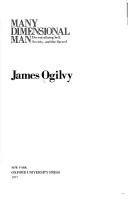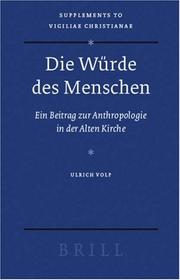| Listing 1 - 10 of 18 | << page >> |
Sort by
|
Book
ISBN: 1608338002 9781608338009 9781626983366 1626983364 Year: 2019 Publisher: Maryknoll, NY
Abstract | Keywords | Export | Availability | Bookmark
 Loading...
Loading...Choose an application
- Reference Manager
- EndNote
- RefWorks (Direct export to RefWorks)
"An exploration of the meaning and identity of the human person in light of a renewed theology of creation, the ongoing discoveries of evolution and natural sciences, and newly appropriated resources in the theological tradition"--
Book
ISBN: 083089960X 9780830899609 0830851208 9780830851201 9780830851201 Year: 2016 Publisher: Downers Grove, Ill.
Abstract | Keywords | Export | Availability | Bookmark
 Loading...
Loading...Choose an application
- Reference Manager
- EndNote
- RefWorks (Direct export to RefWorks)
Theological anthropology --- Image of God. --- God --- God, Image of --- Image (Theology) --- Man (Christian theology) --- Christianity. --- Image --- Image of God --- 233 --- Christianity --- De mens. Theologische antropologie
Book
ISBN: 9783959481274 3959481276 9783869459110 3869459115 Publisher: Traugott Bautz.
Abstract | Keywords | Export | Availability | Bookmark
 Loading...
Loading...Choose an application
- Reference Manager
- EndNote
- RefWorks (Direct export to RefWorks)
233 --- 262.13 JOANNES PAULUS II --- 262.13 JOANNES PAULUS II Pausschap. Heilige Stoel. Vaticaan. Paus als soeverein--JOANNES PAULUS II --- Pausschap. Heilige Stoel. Vaticaan. Paus als soeverein--JOANNES PAULUS II --- 233 De mens. Theologische antropologie --- 233 L'homme. Anthropologie theologique --- De mens. Theologische antropologie --- L'homme. Anthropologie theologique
Book
ISBN: 3322003582 9783322003584 Year: 1987 Volume: vol *267 Publisher: Leipzig: Teubner,
Abstract | Keywords | Export | Availability | Bookmark
 Loading...
Loading...Choose an application
- Reference Manager
- EndNote
- RefWorks (Direct export to RefWorks)
Classical Greek literature --- Philosophical anthropology --- -Philosophical anthropology --- -233 --- Anthropology, Philosophical --- Man (Philosophy) --- Civilization --- Life --- Ontology --- Humanism --- Persons --- Philosophy of mind --- Early works to 1800 --- De mens. Theologische antropologie --- Philosophy --- 233 --- Philosophical anthropology - Early works to 1800

ISBN: 0195022319 Year: 1977 Publisher: New York (N.Y.) Oxford University Press
Abstract | Keywords | Export | Availability | Bookmark
 Loading...
Loading...Choose an application
- Reference Manager
- EndNote
- RefWorks (Direct export to RefWorks)
Civilization, Modern --- -Man --- Human beings --- 233 --- Homo sapiens --- Human race --- Humanity (Human beings) --- Humankind --- Humans --- Man --- Mankind --- People --- Hominids --- Persons --- Modern civilization --- Modernity --- Civilization --- Renaissance --- De mens. Theologische antropologie --- History --- Human beings.
Book
ISBN: 1317167791 1283629437 9786613941886 1409434117 9781409434115 9781409434108 1409434109 9781317167792 9781283629430 6613941883 9781409471189 9781315571515 9781317167785 9781138118614 131557151X Year: 2013 Publisher: Burlington, VT
Abstract | Keywords | Export | Availability | Bookmark
 Loading...
Loading...Choose an application
- Reference Manager
- EndNote
- RefWorks (Direct export to RefWorks)
Children of God sheds new light on the role of the child figure in modernity, and in theological responses to it, the book makes an important contribution to the disciplines of historical theology, theology and literature and ecumenical theology. Through a careful exploration of the continuities and differences in the work of Thomas Traherne, Jean-Jacques Rousseau, Friedrich Schleiermacher and Charles Péguy, it traces the ways in which their distinctive responses to human childhood structured the broader pattern of their theology.
Children --- Theological anthropology --- Man (Christian theology) --- Children (Christian theology) --- Religious aspects --- Christianity. --- 233 --- Childhood --- Kids (Children) --- Pedology (Child study) --- Youngsters --- Age groups --- Families --- Life cycle, Human --- Religious aspects&delete& --- Christianity --- De mens. Theologische antropologie
Book
ISBN: 0813228484 9780813228488 9780813228471 0813228476 Year: 2016 Publisher: Washington, D.C.
Abstract | Keywords | Export | Availability | Bookmark
 Loading...
Loading...Choose an application
- Reference Manager
- EndNote
- RefWorks (Direct export to RefWorks)
Theological anthropology --- Sex --- Human body --- Catholic Church. --- Religious aspects --- Thomas, --- John Paul --- Akʻvineli, Tʻoma, --- Akvinietis, Tomas, --- Akvinskiĭ, Foma, --- Aquinas, --- Aquinas, Thomas, --- Foma, --- Thomas Aquinas, --- Tʻoma, --- Toma, --- Tomas, --- Tomasu, --- Tomasu, Akwinasu, --- Tomasz, --- Tommaso, --- Tʻovma, --- Тома, Аквінський, --- תומאס, --- תומס, --- اكويني ، توما --- 233 --- 262.13 JOANNES PAULUS II --- 2 THOMAS AQUINAS:233 --- 2 THOMAS AQUINAS:233 Godsdienst. Theologie-:-De mens. Theologische antropologie--THOMAS AQUINAS --- Godsdienst. Theologie-:-De mens. Theologische antropologie--THOMAS AQUINAS --- 262.13 JOANNES PAULUS II Pausschap. Heilige Stoel. Vaticaan. Paus als soeverein--JOANNES PAULUS II --- Pausschap. Heilige Stoel. Vaticaan. Paus als soeverein--JOANNES PAULUS II --- Gender (Sex) --- Human beings --- Human sexuality --- Sex (Gender) --- Sexual behavior --- Sexual practices --- Sexuality --- Sexology --- Body, Human --- Body image --- Human anatomy --- Human physiology --- Mind and body --- Religious aspects&delete& --- Catholic Church --- De mens. Theologische antropologie --- Ākvīnās, Tūmās, --- اكويني، توما, --- آکويناس، توماس,

ISBN: 0521807328 0521001897 0511018967 0511044437 0511175310 0511155573 0511323514 1280419288 0511613180 1107124492 9780511018961 9780521807326 9780521001892 9780511613180 9786610419289 6610419280 Year: 2002 Publisher: Cambridge, UK ; New York, NY : Cambridge University Press,
Abstract | Keywords | Export | Availability | Bookmark
 Loading...
Loading...Choose an application
- Reference Manager
- EndNote
- RefWorks (Direct export to RefWorks)
This is a major new study of Thomas Aquinas, the most influential philosopher of the Middle Ages. The book offers a clear and accessible guide to the central project of Aquinas' philosophy: the understanding of human nature. Robert Pasnau sets the philosophy in the context of ancient and modern thought, and argues for some groundbreaking proposals for understanding some of the most difficult areas of Aquinas' thought: the relationship of soul to body, the workings of sense and intellect, the will and the passions, and personal identity. Structured around a close reading of the treatise on human nature from the Summa theologiae and deeply informed by a wide knowledge of the history of philosophy and contemporary philosophy, this study will offer specialists a series of novel and provocative interpretations, while providing students with a reference commentary on one of Aquinas' core texts.
Philosophical anthropology. --- Theological anthropology --- Man (Christian theology). --- Anthropologie philosophique --- Anthropologie théologique --- Homme (Théologie chrétienne) --- Christianity. --- Christianisme --- Thomas, --- Man (Christian theology) --- Philosophical anthropology --- #GBIB:CBMER --- Anthropology, Philosophical --- Man (Philosophy) --- Civilization --- Life --- Ontology --- Humanism --- Persons --- Philosophy of mind --- Philosophy --- Thomas Aquinas, Saint --- Theological anthropology. --- Thomas. --- Philosophy & Religion --- Christianity --- 2 THOMAS AQUINAS:233 --- 130.1 --- 130.1 Wijsgerige antropologie:--algemene begrippen en wetmatigheden --- Wijsgerige antropologie:--algemene begrippen en wetmatigheden --- 2 THOMAS AQUINAS:233 Godsdienst. Theologie-:-De mens. Theologische antropologie--THOMAS AQUINAS --- Godsdienst. Theologie-:-De mens. Theologische antropologie--THOMAS AQUINAS --- Anthropologie théologique --- Homme (Théologie chrétienne) --- Arts and Humanities

ISSN: 0920623X ISBN: 9004154485 9789004154483 9786611400880 1281400882 9047411277 9789047411277 Year: 2006 Volume: 81 Publisher: Leiden: Brill,
Abstract | Keywords | Export | Availability | Bookmark
 Loading...
Loading...Choose an application
- Reference Manager
- EndNote
- RefWorks (Direct export to RefWorks)
There can be no doubt that there is a link between early Christian statements on human dignity and the corresponding modern concept, as it appears ever more frequently in current bioethical debates. This study attempts to throw light on the surprisingly complex process of the emergence of such a Christian concept of human dignity in antiquity and portrays it as a process governed by contradictions and antagonisms: between biblical and platonic anthropology; between a platonic and a stoic perception of humanity; between gnostic and antignostic cosmology; between biblically based criticism of human culture on the one hand and heilsgeschichtlichem cultural optimism on the other hand; between Greek and Roman thinking. This history of the idea of the “dignity of man” is being recounted taking into consideration the complex matrix of Christian theory and practice (including issues such as worship, contraception and abortion), piety and theological reflection, ethics, liturgy and theological as well as cutural anthropology. *** Bei dieser Studie handelt es sich um den Versuch einer zusammenfassenden Darstellung der christlich-antiken Auseinandersetzung mit der Würde des menschlichen Lebens Diese wird nicht nur gegenwärtig etwa in der Bioethik wieder kontrovers diskutiert, sondern ist auch in der Antike ein Feld philosophischer und theologischer Überlegungen gewesen. Volp fragt, inwieweit sich in den Schriften der antiken christlichen Denker die Vorstellung einer mit einer besonderen Würde ausgestatteten gemein-menschlichen Natur findet, die Menschen von Tieren und von belebter und unbelebter Materie unterscheidet, und wie diese Natur gefaßt und begründet wird. Ausgehend von der These, daß diese Überlegungen nicht nur Auswirkungen auf die ethische und religiöse Praxis der Alten Kirche hatten, sondern umgekehrt auch entscheidend von ihr geprägt wurden, konzentriert sich die Arbeit nicht nur auf die theoretischen Äußerungen der Kirchenväter, sondern bezieht ethische Konkretionen (Schwangerschaftsabbruch, Umgang mit Menschen mit Behinderungen, Krieg) und den christlichen Kult mit in die Untersuchung ein. Zum Vorschein kommt ein überraschend komplexes Bild einer alles andere als selbstverständlichen geistesgeschichtlichen Entwicklung, deren Folgen bis in die heutige Zeit nachwirken.
Theological anthropology --- Dignity --- Christianity --- History of doctrines --- Religious aspects --- 233 --- De mens. Theologische antropologie --- Human dignity --- Values --- Man (Theology) --- Primitive and early church, ca. 30-600 A.D. --- Theological anthropology - Christianity - History of doctrines - Early church, ca 30-600. --- Dignity - Religious aspects - Christianity - History of doctrines - Early church, ca. 30-600.
Book
ISBN: 9780857452078 085745207X 9780857452085 0857452088 1283326450 9786613326454 Year: 2011 Publisher: New York Berghahn Books
Abstract | Keywords | Export | Availability | Bookmark
 Loading...
Loading...Choose an application
- Reference Manager
- EndNote
- RefWorks (Direct export to RefWorks)
Social scientists and philosophers confronted with religious phenomena have always been challenged to find a proper way to describe the spiritual experiences of the social group they were studying. The influence of the Cartesian dualism of body and mind (or soul) led to a distinction between non-material, spiritual experiences (i.e., related to the soul) and physical, mechanical experiences (i.e., related to the body). However, recent developments in medical science on the one hand and challenges to universalist conceptions of belief and spirituality on the other have resulted in "body" and "
Human body --- Corps humain --- Religious aspects. --- Aspect religieux --- -#SBIB:39A10 --- 233 --- Body, Human --- Human beings --- Body image --- Human anatomy --- Human physiology --- Mind and body --- Antropologie: religie, riten, magie, hekserij --- De mens. Theologische antropologie --- Body, Human (in religion, folk-lore, etc.) --- #SBIB:39A10 --- Religious aspects
| Listing 1 - 10 of 18 | << page >> |
Sort by
|

 Search
Search Feedback
Feedback About UniCat
About UniCat  Help
Help News
News